Bee pollen for chickens? It’s one of my favorite superfoods and it’s very healthy for hens!
Yep, you can feed bee pollen to chickens, and as I discuss below, it has great health benefits for your flock. And honey bees are to thank!
One of my favorite ways to share this treat with my hens is by offering it in the spring, when my flock starts to consistently lay again. The ground is muddy (yuck), which means the amount of parasites and bad bacteria that flourish in wet environments SKYROCKETS.
As your chickens hunt and peck (and poop), they’re going to naturally pick up parasites. (They need to invent chicken shoes.) It’s gross, and even grosser when you look at it under a microscope. Who wants a mouthful of eggs teeming with salmonella and who knows what? Not me!
Don’t limit this golden jewel to just Spring though, there are benefits in the winter months too. It’s so beneficial, that I use it year-round.
That’s why I am sharing this bee pollen treat for backyard chickens. You’ll be surprised how healthy it is!
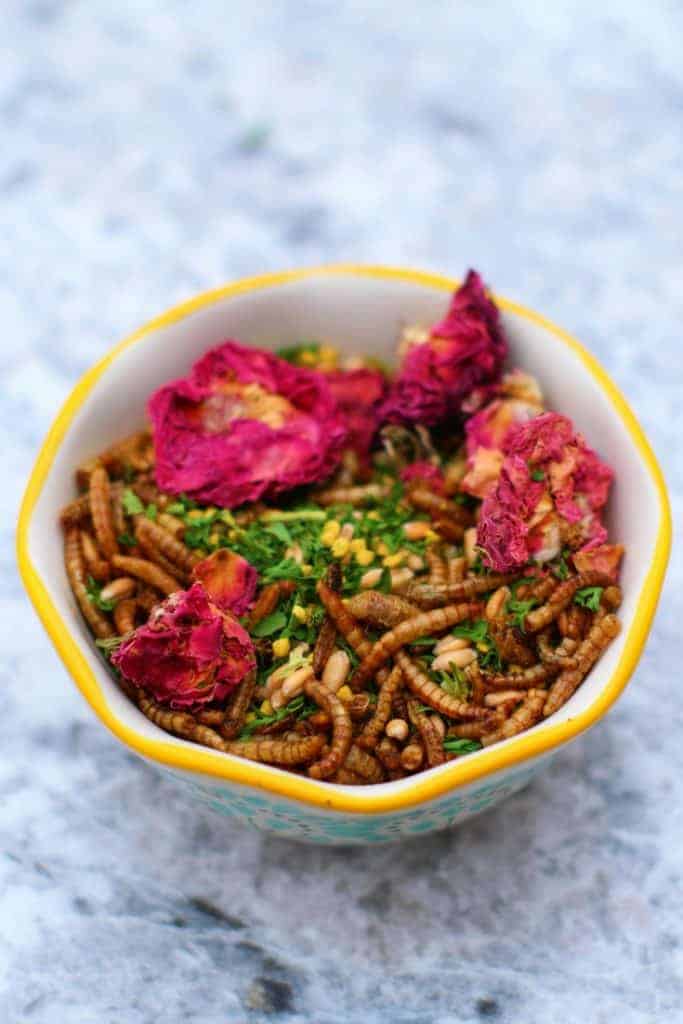
Table of Contents (Quickly Jump To Information)
What Is Bee Pollen?
Bee pollen is made by busy bees working their magic. As bees buzz from flower to flower, collecting nectar, they also get covered in pollen. They mix this pollen with a bit of nectar and their own enzymes to create small, sticky pellets. These pellets are what we call bee pollen.
Bees carry these back to their hive, tucking them into special baskets on their legs – it’s like their grocery shopping! Once back at the hive, they store this pollen in the honeycomb, where it’s used as a food source for the colony. It’s a pretty cool natural process, turning flower dust into a super nutritious food!
If you haven’t seen the Bee Movie, now would be a good time. It’s a cute animated movie that has a great way of showing how bees use pollen.
Why Is Bee Pollen Good?
Honey bee pollen is like nature’s multivitamin! It’s a mix of sugars, proteins, fats, vitamins, and minerals, with a bit of health-boosting compounds like antioxidants thrown in.
The exact mix depends on the plants the bees visited, but generally, you’ll find stuff like fructose, glucose, amino acids, and fatty acids in there. It’s also packed with B vitamins and minerals like potassium and zinc. Basically, it’s super nutritious and great for health.
Bee Pollen for Backyard Chickens
We’re starting to recognize the health benefits of bee pollen for humans, but believe it or not, it’s also been pretty well studied for chickens.
In case you didn’t know, bee pollen is one of those “superfoods” that contains not just a ton of vitamins and minerals, but also more protein than meat! The use of bee pollen is not new, yet many people still don’t know about it.
It helps that chickens LOVE to peck at the tiny bits of bee pollen!
Studies
Multiple studies have been done to examine the health impacts of feeding bee pollen to chickens. And the results are pretty interesting (if you want the fast version: it’s really healthy.)
As a feed additive (or feed mixture), bee pollen shows signs of being a powerful way to prevent parasites and bad bacteria while increasing the overall health of the chicken.
In one study, chickens fed 35 grams of bee pollen per 1 kilo of feed showed more beneficial bacteria in their guts – which means a healthier bird overall.
This same study also showed that bee pollen reduced the amount of bad bacteria – meaning that bee pollen showed antibacterial properties. In particular, bee pollen was shown to reduce the amount of K. oxytoca, a bacterium that can cause sepsis and colitis in people.
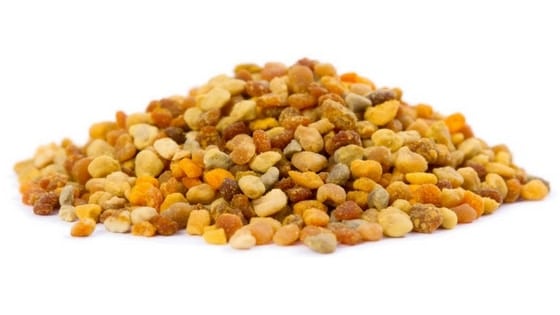
Multiple studies have shown that chickens with higher amounts of beneficial bacteria not only GREW better (because their immune response increased which meant they weren’t battling bad bacteria like campylobacter as much) but LAID healthier eggs (because the eggs were less likely to be transmitters of bad bacteria like salmonella).
In another study, bee pollen was shown to increase the length of villi in the digestive tracts of chickens. In case you didn’t know, the villi in the digestive tracts allow people and animals to absorb nutrients as we digest. So, longer villi have more surface area, which can mean it’s easier for your chicken to absorb nutrients – which means she’ll be healthier. It’s a small difference, but a crucial one.
As you can see from all these studies and statistical analysis, the effect of bee-pollen supplementation is worth taking a look at.
Peppermint, Rose, and Parsley, Oh My!
I’ve also included peppermint in this treat for a similar reason: Peppermint has strong antibacterial qualities while also helping to settle tummies.
Rose, as well, is known for its soothing and skin-healing properties (that’s why you see it in so many lotions for people). My chickens particularly love rose because it’s red — for some reason, red is a popular color with hens!
Parsley is one of my favorite “hidden gems” — it’s a humble herb we’ve relegated to garnish status, but it’s full of vitamins!
So, as your hens enjoy eating the bee pollen, they’ll also get lots of extra nutrients from the parsley.
Don’t Forget The Mealworms!
And, of course, mealworms! Mealworms are an all time favorite of chickens, and they are packed full of protein! You might find that your hens go for the mealworms first, but rest assured, they’ll finish off the rest of the ingredients as well!
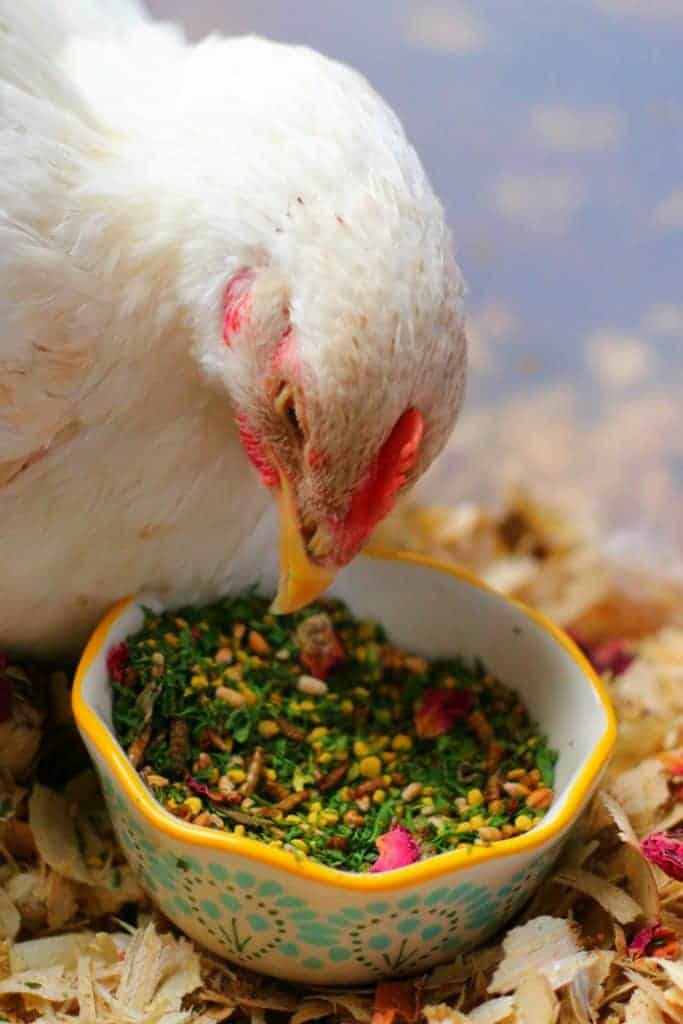
Bee Healthy Backyard Chicken Treat
You can gather the ingredients and make this chicken treat or hit the easy button and order Be A Happy Beautiful Hen treat here. Either way, your flock will benefit and so will you!
Ingredients (per chicken)
½ tsp Bee pollen
1 tablespoon Peppermint
1 tablespoon Parsley
¼ cup Mealworms (buy in the store here)
1 tablespoon Rose buds
¼ cup Non-GMO Wheat Berries
Directions
Combine ingredients in a bowl and offer immediately. Serve as part of a complete diet, like this Preium Layer Feed, alongside grit.
Did You Know?
- Bee pollen has over a dozen vitamins (such as Vitamin A, Vitamin C, Vitamin D, Vitamin E, a whole host of Vitamin B’s, and more).
- Bee pollen is also packed with minerals (such as potassium, phosphorus, calcium, sodium and zinc).
- It also has many essential fatty acids.
- Supplementing with bee pollen can promote growth and boost immune systems.
- Bee pollen is about 50% carbohydrates.
- Can be used strategically (considering the effect of different levels of bee pollen) as a dietary supplement for broiler chickens to increase productive performance (mainly feed intake) and, therefore, increase body weight.
- The trophic effect of bee pollen on poultry intestinal tracks is impressive.
- Bee pollen is a rich source of essential amino acids.
- Don’t forget the bonus surprise, bee pollen has a lot of protein!
Bee Polen VS Bee Propolis
Bee pollen and bee propolis are both awesome bee products, but they’re quite different. Pollen is basically the substance bees collect from flowers, mixed with a bit of nectar and bee enzymes. It’s like bee bread – a protein-rich food for the hive. On the other hand, bee propolis is more like bee glue. Bees make it by mixing saliva and beeswax with sap from trees and other botanical sources. They use this sticky, resinous substance to seal cracks and sanitize their hive.
So, pollen is bee food, and propolis is a bee-made building and cleaning material. Cool, right?
How Bee Propolis Is Used
Bee propolis is like nature’s antibiotic and has been a go-to for both people and animals for ages. For us humans, it’s often used as a natural remedy for colds, and sore throats, and even as a skin healer for cuts and burns because of its antibacterial and anti-inflammatory properties. It’s also found in various health supplements and cosmetics.
As for animals, beekeepers sometimes use it to help keep their hives healthy, and some pet owners use propolis-based products to treat their furry friends’ wounds or skin issues. It’s pretty amazing how this bee-made substance can be so handy for both us and our animal buddies!
There are a fair amount of studies regarding the effects of propolis as well.
Summary
Animal nutrition is much like human nutrition. It’s important to use good “fuel” to produce the best chemical composition.
Bee pollen is one superfood you don’t want to skip in order to embrace an excellent nutrition plan. All that and it can boost immunity too! So why not?
Maat van Uitert is a backyard chicken and sustainable living expert. She is also the author of Chickens: Naturally Raising A Sustainable Flock, which was a best seller in it’s Amazon category. Maat has been featured on NBC, CBS, AOL Finance, Community Chickens, the Huffington Post, Chickens magazine, Backyard Poultry, and Countryside Magazine. She lives on her farm in Southeast Missouri with her husband, two children, and about a million chickens and ducks. You can follow Maat on Facebook here and Instagram here.

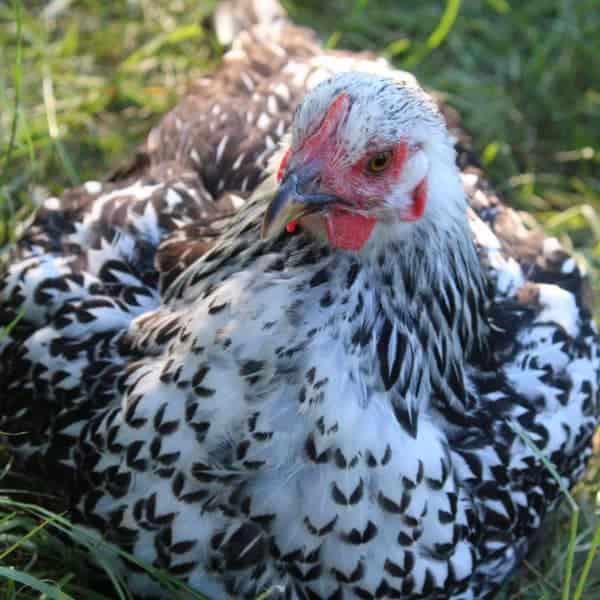
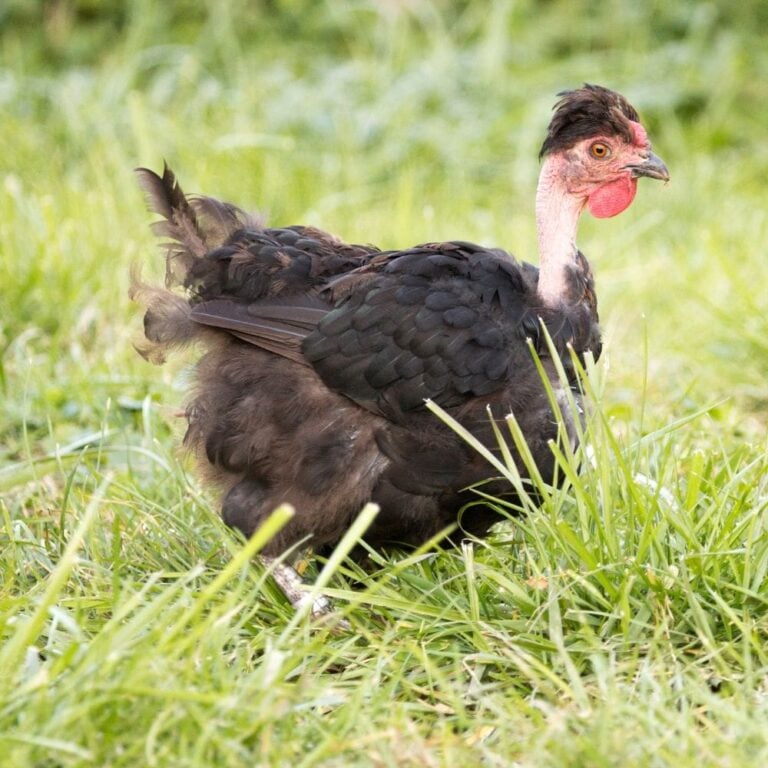
![4 Types Of Poultry You Can Raise With Hens To Be More Self-Sufficient [Podcast]](https://thefrugalchicken.com/wp-content/uploads/2016/07/raise-poultry-with-chickens-feature-min.jpg)
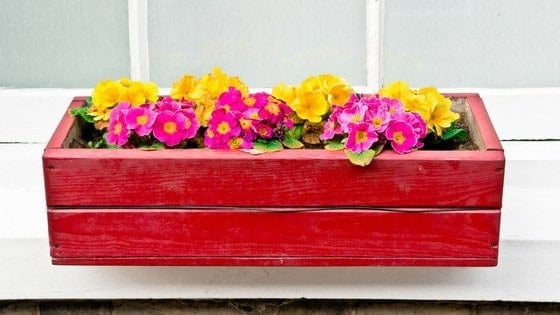
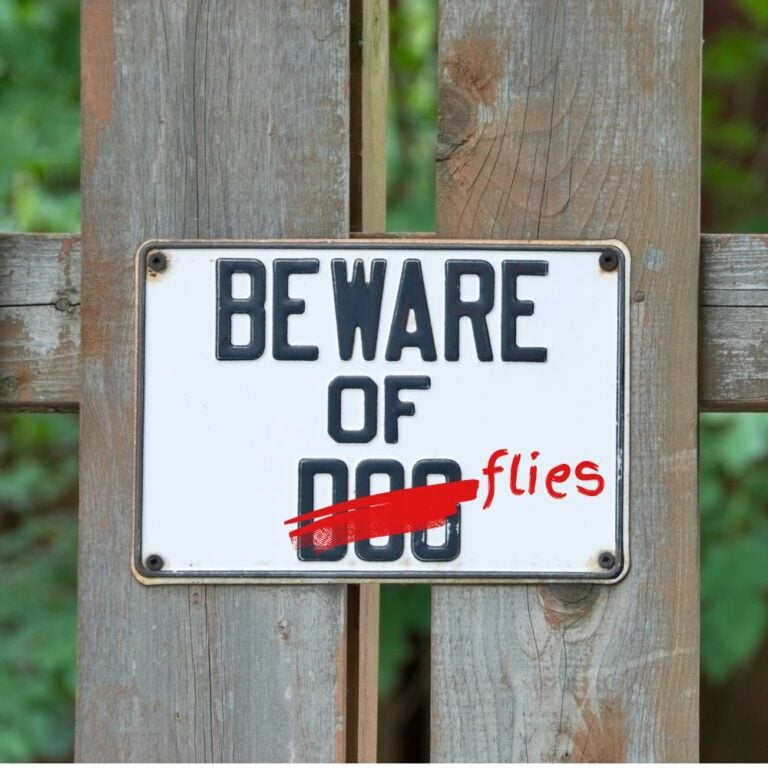
Can the bee pollen be added to their ‘mash’ (fermented feed)?
Yes!